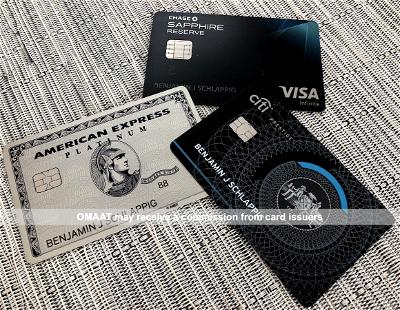There are lots of amazing business credit cards out there nowadays, with huge welcome offers, great return on spending, and valuable perks. The awesome thing is that you’re eligible for business credit cards even if you have a small side business.
One common question I get from readers is whether you can use business credit cards for personal spending. It’s something that some people wonder in situations where they have to reach a big minimum spending requirement, for example. I wanted to address that in a bit more detail in this post.
In this post:
You’re not supposed to use business cards for personal spending
Let me cut to the chase. Virtually all business credit cards have rules against using the cards for personal use. When you apply for a business credit card, you’ll see that all issuers have terms you have to agree to about how you’ll use the card. For example, looking at the application for a Capital One business card, you’ll see the following verbiage:
“Acknowledge and agree that all cards and convenience checks will be used solely for business or commercial purposes and not for personal, family or household purposes.”
You’ll find similar language with all issuers. Now, to be perfectly clear, there’s nothing illegal about using a business credit card for personal expenses. Rather it simply violates the agreement you have with a credit card company.
Why would card issuers have this policy? Well, generally speaking business cards have higher merchant fees than personal cards, and presumably that’s at least partly because credit card issuers have been able to sell merchants on the concept that those with business cards are more likely to spend more. Requiring that business cards only be used for business purchases ensures that the spirit of that is maintained.
Furthermore, credit card issuers use third parties to fulfill many of their benefits, from rental car insurance, to cell phone protection. These benefits are intentionally limited to certain types of purchases, so the idea is that card issuers need to make sure that card members are adhering to those limitations.
In the interest of being thorough, what about the inverse? Can you use personal cards for business expenses? You’d think that this would be uniformly allowed, since many people use personal cards for business expenses and then get reimbursed. However, some card issuers restrict this. For example, looking at the cardmember agreement for some Citi cards, you’ll see the following verbiage:
“You aren’t permitted to use your Account for business purposes. If you do use your Account for business purposes, this Agreement still applies, and you must pay us for those Transactions. You have to pay us for any damages and/or expenses resulting from that use. In addition, we may also close your Account.”

What happens if you use a business card for personal spending?
For a vast majority of purchases, a card issuer would have no clue whether you’re making personal or business purchases. After all, expenses for meals, flights, hotels, etc., could be for business or personal use. I haven’t seen many reports of card issuers requesting proof of the reason for a purchase.
Now, I assume if you claim to have a property management business and you’re spending $200K per year on your business card on grocery store purchases, maybe some red flags will be raised. But it’s honestly rare to hear of situations where card issuers question whether a purchase is for business reasons or not.
One situation where you’ll want to be especially careful with the card you use is when it comes to insurance and other coverage perks. For example, if your card has cell phone protection, rental car coverage, travel protection, etc., you’ll want to be sure you’re using the correct type of card.
If you use a business card with rental car coverage to rent a car and then have an accident, you’ll be asked to confirm with your paperwork that your rental was indeed for business purposes. When you’re signing an insurance document, you’re not going to want to lie.

Bottom line
Across the board, credit card issuers have rules against using business credit cards for personal spending. You agree to this when you apply for a card. However, in practice there’s not typically much ongoing enforcement of this, since a card issuer doesn’t actually know what the purpose of your purchases is.
You’ll want to be especially careful with using the right cards in situations where you might be needing an insurance or protection benefit, whether it’s rental car coverage, cell phone protection, delayed travel coverage, etc.
What’s your take on using business credit cards for personal spending?





The primary reason banks want to keep business accounts separate is because different laws apply to consumer accounts. For example, if you read the FCRA, you'll notice that it defines "consumer report" as pertaining only to credit "used primarily for personal, family, or household purposes." So, business cards aren't covered by the many consumer protections that consumer financial transactions receive. As long as you pay your bills on time and don't have any other billing...
The primary reason banks want to keep business accounts separate is because different laws apply to consumer accounts. For example, if you read the FCRA, you'll notice that it defines "consumer report" as pertaining only to credit "used primarily for personal, family, or household purposes." So, business cards aren't covered by the many consumer protections that consumer financial transactions receive. As long as you pay your bills on time and don't have any other billing disputes, you might not notice any issues. But, if push comes to shove and you need to enforce your rights under the FCRA, FCBA, or their implementing regulations, you might find out that the bank holds all the cards. So, the credit card issuers want to make sure they are complying with the relevant laws, and they also don't want to waive their beneficial position with respect to business accounts by allowing customers to charge personal expenses such that the customers could then claim that they should be covered under the more protective consumer laws.
That is the whole point. Most charges or merchants would be tough to prove.
That car rental insurance point is potentially very important.
Agreed.
The insurer could easily deny coverage in an ink card used for personal driving.
An attorney warned me that if I use a corporate credit card for personal use someone suing the corporation might be able to get around the corporate protection & go against me personally. That attorney told me to only use corporate credit cards for business purposes & to always pay for those credit cards with the corporation's checking account. Another attorney told me that it would take a lot more than that to get around the corporation protection.
They're both right, to an extent. Comingling your personal finances with those of the corporation could potentially provide a basis, in conjunction with other evidence, to pierce the corporate veil. But merely sometimes using a small business card for a personal expense almost certainly wouldn't be enough, without more. Comingling assets is a piece of evidence that could be used against you, but someone suing you would need to show that you essentially disregarded the...
They're both right, to an extent. Comingling your personal finances with those of the corporation could potentially provide a basis, in conjunction with other evidence, to pierce the corporate veil. But merely sometimes using a small business card for a personal expense almost certainly wouldn't be enough, without more. Comingling assets is a piece of evidence that could be used against you, but someone suing you would need to show that you essentially disregarded the corporate form entirely and treated the corporation as your alter ego.
If you're relying on your corporation to shield you from personal liability, you may be better off keeping good records separating corporate financial transactions and activities from your own personal activities. (Note: not legal advice; you should consult a lawyer about the specifics of your situation and the liabilities you may face.)
Merchant fees are a PERCENTAGE right?
If you spend more, the issuer is already getting more…?
Merchant fees in the US are on that list of things that make the your country absolutely insane. How is it sustainable?
Its all priced in from sale perspective. Insane is a good term, benefiting if you understand the system but majority ends up paying more without knowing it, as merchant fees are typically not displayed. As opposed to the local fees, save-Jenny-the-three-legged-dog-levy, workers-protection-charges etc that bloat the typical American bills.
Merchants get a lot of benefits from accepting cards. They have increased sales (and therefore higher profits) and lower transaction costs (e.g., they don't have customers holding up the line while they fumble around for cash; they don't have to worry about cash missing from the register; at stores that go cashless, they don't need to worry about employees making bank runs every day; etc.). Clearly the fees charged are less than the benefits merchants...
Merchants get a lot of benefits from accepting cards. They have increased sales (and therefore higher profits) and lower transaction costs (e.g., they don't have customers holding up the line while they fumble around for cash; they don't have to worry about cash missing from the register; at stores that go cashless, they don't need to worry about employees making bank runs every day; etc.). Clearly the fees charged are less than the benefits merchants obtain because nearly all merchants these days have made the decision to take cards.
Is this unfair to consumers who pay cash? No, because cash payments have significant costs associated with them as well (e.g., some percentage of a merchant's incoming cash just goes missing; there are bank fees on merchants that make large cash deposits; merchants that accept cash need to dedicate employee time to count, secure, and deposit the cash). Increasingly a lot of places are going cashless because it's ultimately cheaper for them to just accept cards and not incur the costs and hassles of handling cash.